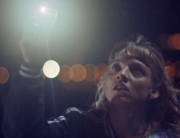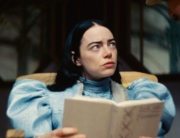Never underestimate the power of an opening sequence to immediately convince you that you will want to watch the rest of the movie, especially when it cleverly introduces the complexities of its internal universe through action without resorting to exposition as an easy way out (a common trap in fantasy or stories imbued with the supernatural).
The Animal Kingdom is a good example of this because of what it depicts and omits in its introduction: François (Romain Duris) and Émile (Paul Kircher), a father and his son, are stuck in traffic as they head to a hospital to visit their respective wife and mother, Lana (Florence Deretz). As a challenge to François, the teenager, who doesn’t want to go, jumps out of the car, and is immediately pursued by his father, who urges Émile to come back. Their discussion is put on hold, though, as they come near an ambulance from which noises and thumps can be heard, revealing a force that cannot be human. Indeed, chaos ensues: A winged humanoid escapes from the vehicle. Is this a shock because the creature is something never seen before, or is it a frequent, everyday presence? The big surprise is to discover that it’s the latter.
In Thomas Cailley’s second film as director (after the romcom Love at First Fight), contemporary France has been altered by a presumably global phenomenon (although the script doesn’t bother much with giving details of its scope) in which mutants have been living among the population for some time. Measures have been implemented to control these specimens through segregation. François and Émile have been affected after Lara underwent a mutation. The authorities are about to transfer her to a residential center in the southern countryside that has been set aside for these creatures. As expected, the affected individuals have been separated from their families and society and deemed potentially dangerous. They have also become the targets of intolerance and rejection by those who consider them “critters.” François, though, is compelled to move across the country to live closer to his wife, although Émile disagrees with the relocation.
The situation is complicated further when, during the transfer, one of the vehicles carrying the hybrids, including Lara, overturns. That initiates a militarized search for the now missing mutants. Meanwhile, Émile not only faces adaptation to a new place where he knows no one but also deals with the changes related to being a teenager: His body begins to show signs of progressive mutation, and he establishes a fraternal bond with the bird-man seen in the beginning, and helps him learn to fly. Scenes like these are treated with the same emotional honesty as the conflicts more typical of the everyday world (a father learning to reconnect with his teenage son, the attraction between Émile and a classmate in his new school).
And yes, the metaphor of adolescence growing pains is on the nose, and the ramifications of a socially rejected group inspires readings not difficult to decipher. Clearly Cailley has made a movie where these themes have been explored before. Nevertheless, the result is entertaining and told with empathy and intelligence. The film is elevated by a magnificent score composed by Andrea Laszlo de Simone that energizes the action scenes and the impeccable visual effects and make-up.
Although Cailley’s movie may not be particularly innovative outside of being a European film flirting with formulas and genres that are generally associated with Hollywood, there’s something about its young adult fantasy spirit that compels, all without feeling derivative. Its lack of pretension and its willingness to explore familiar terrain without ceasing to care about its characters are part of its charm. There are not enough directors willing to unleash their imagination with authentic crowd-pleasers, independent of endless franchises. It shouldn’t be an oddity to find out that these types of fantastical stories can also be told splendidly with a unique flavor of their own.







Leave A Comment